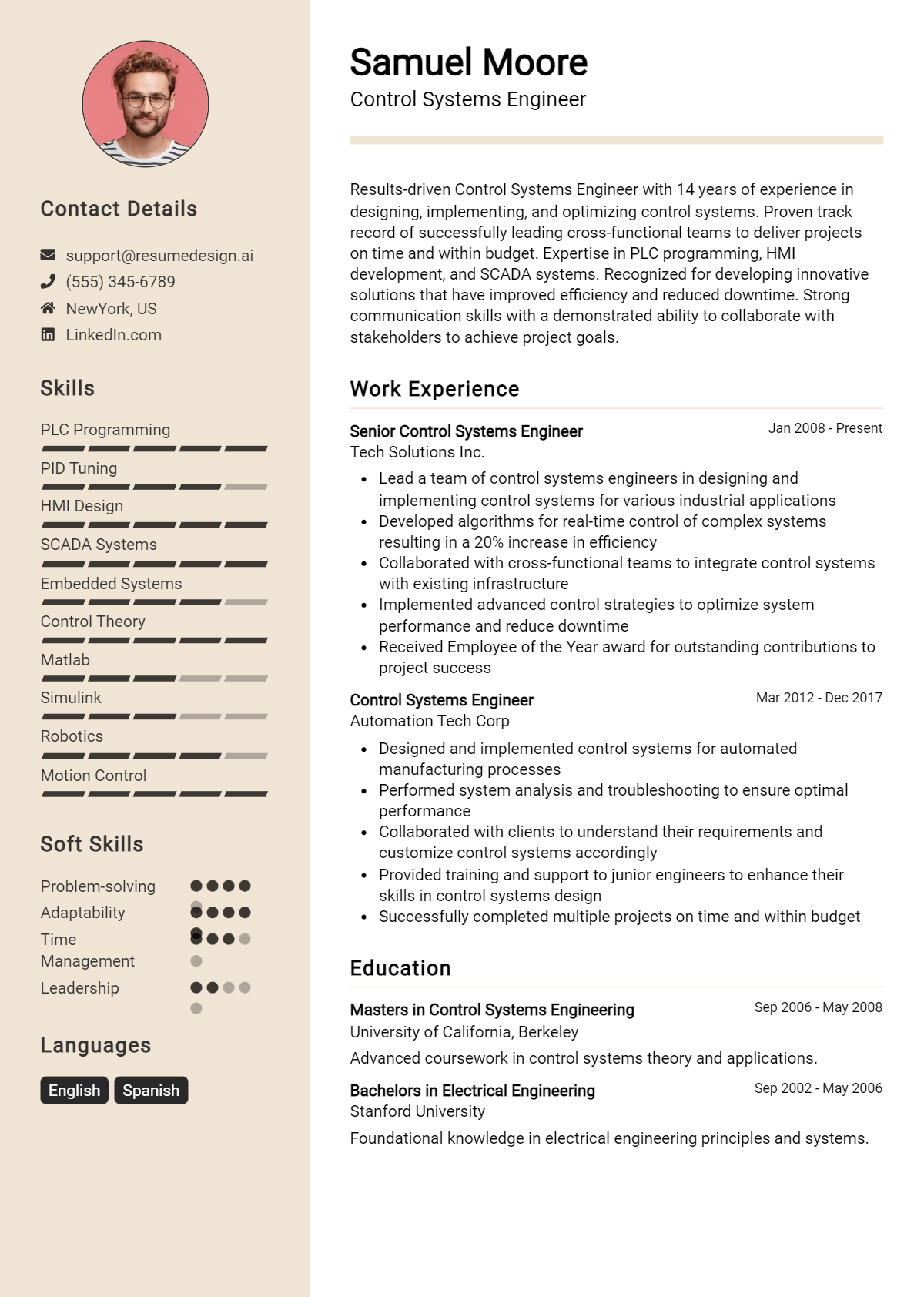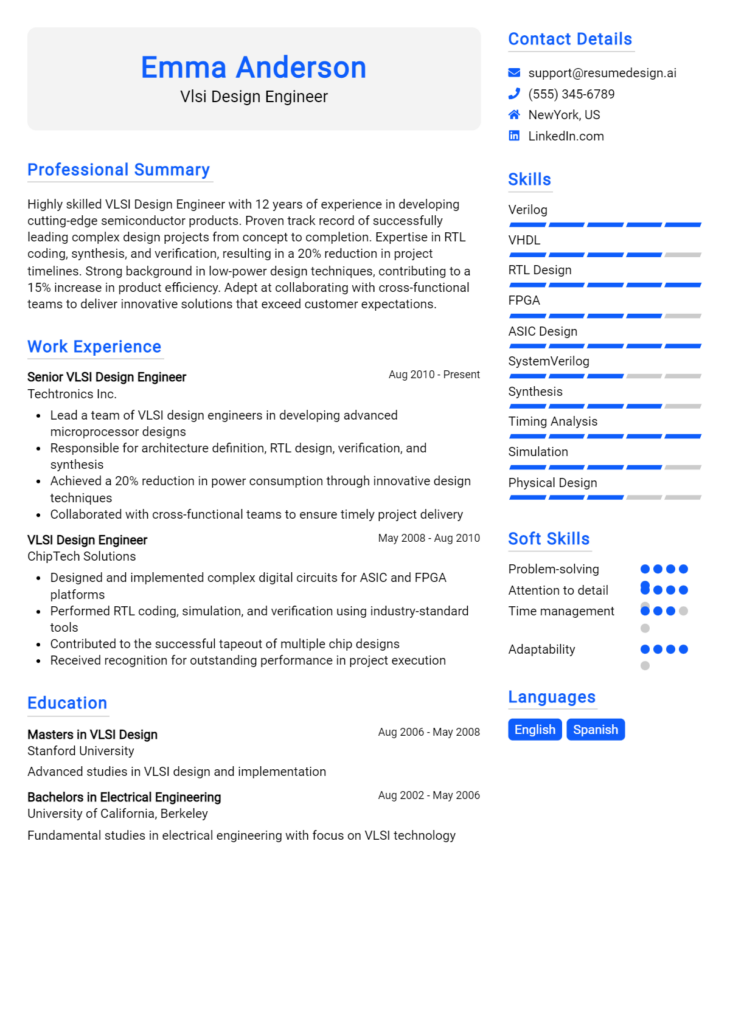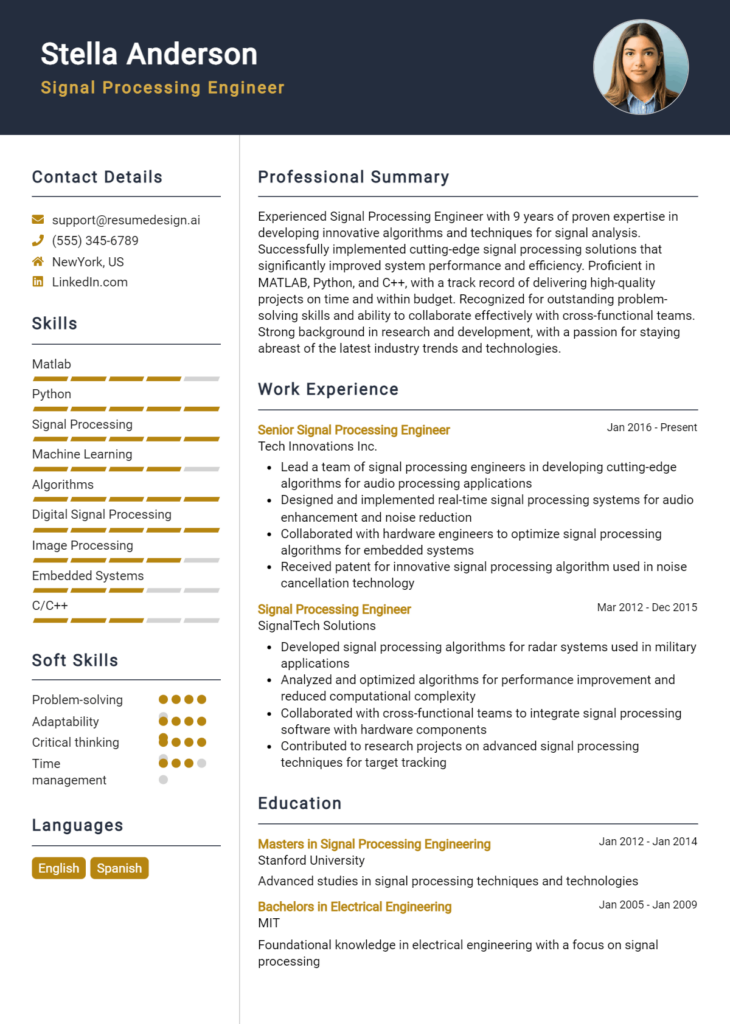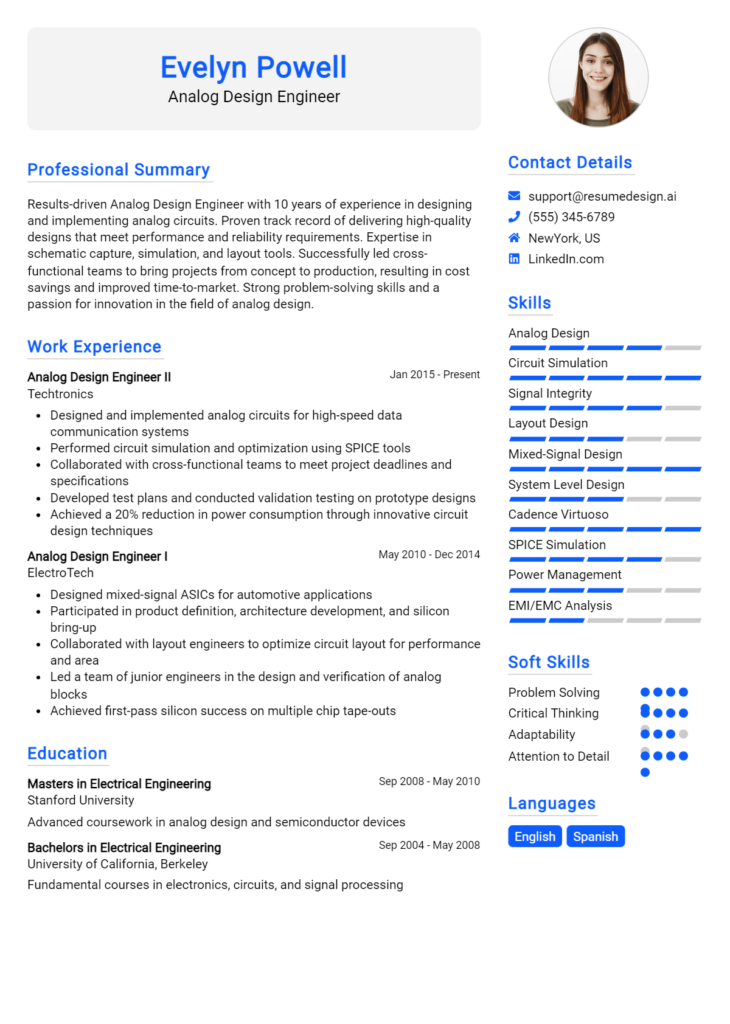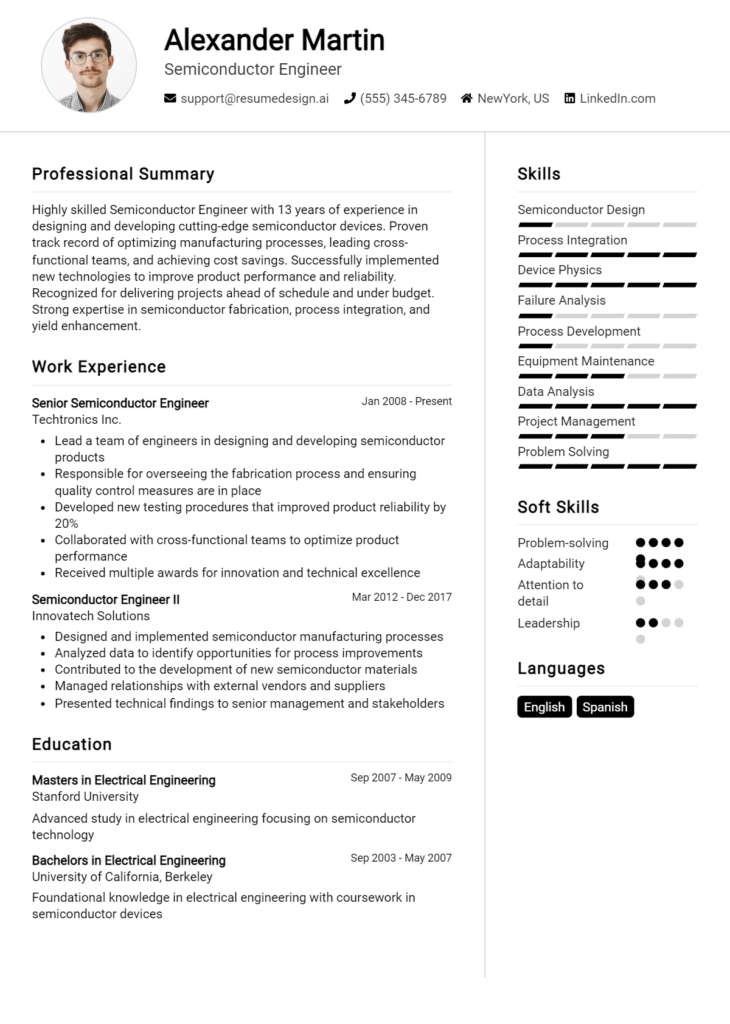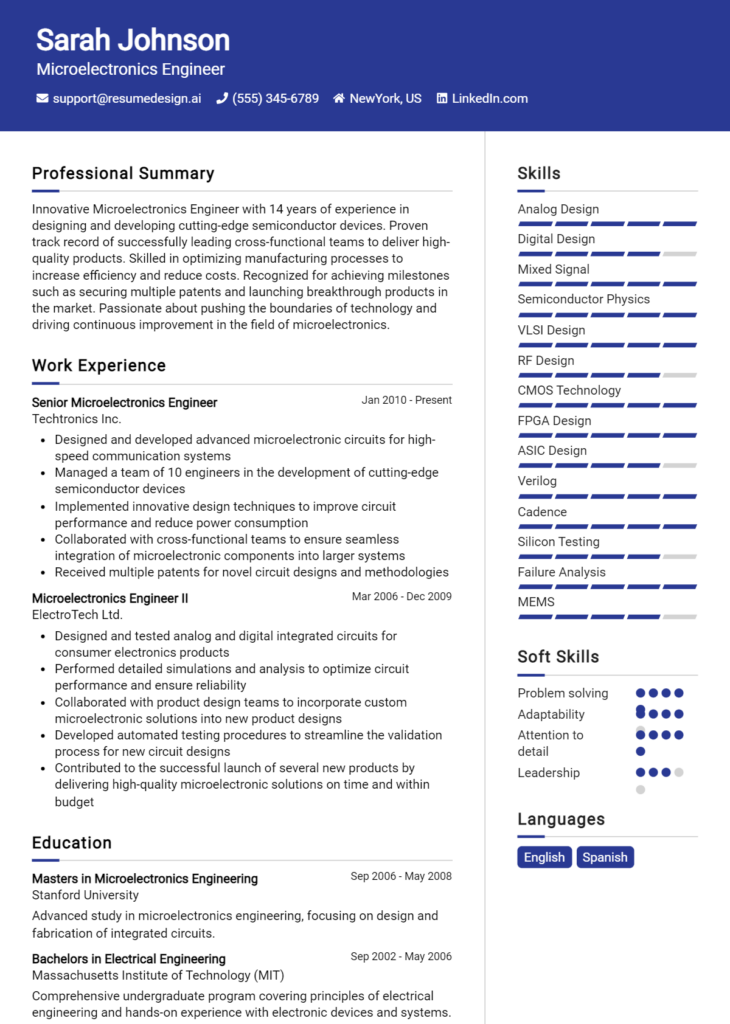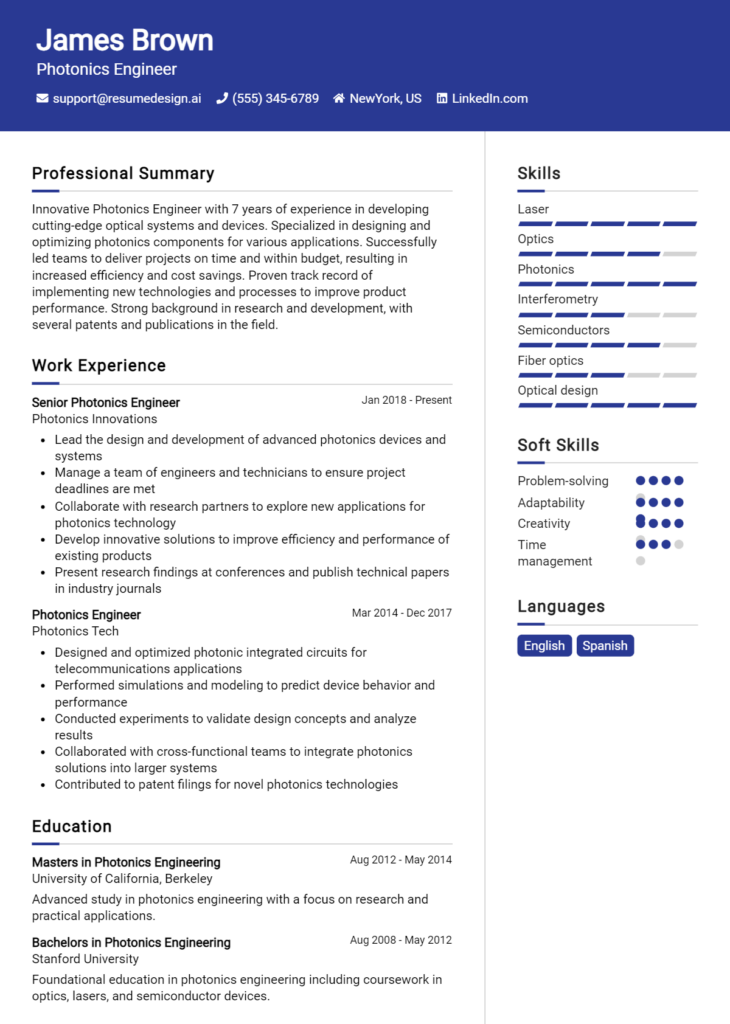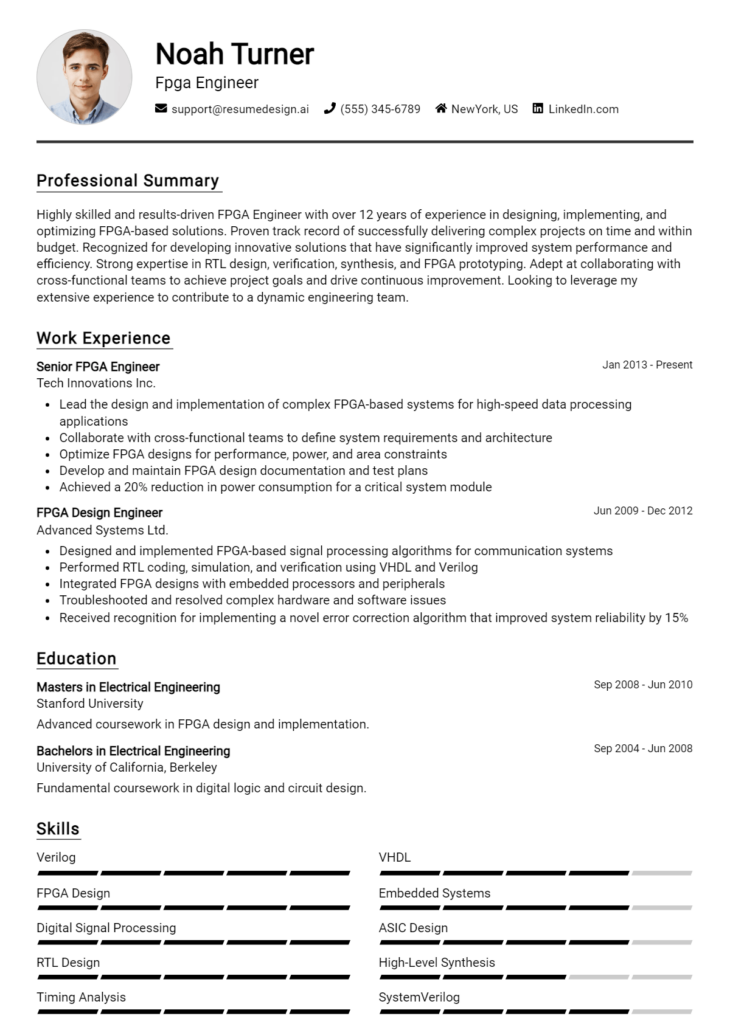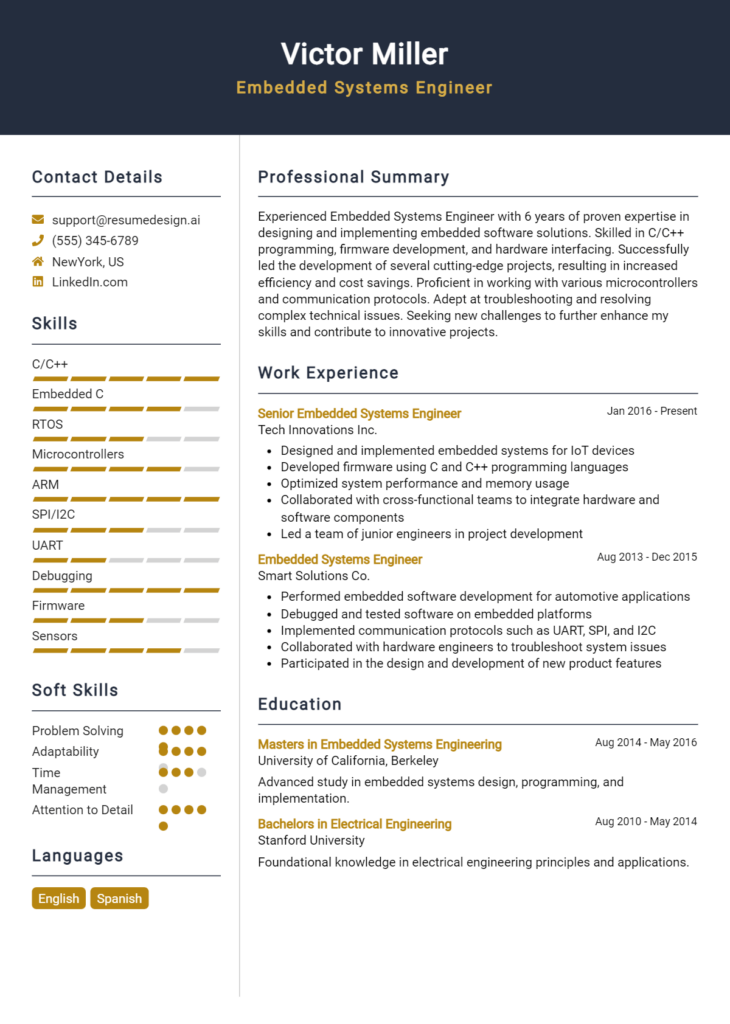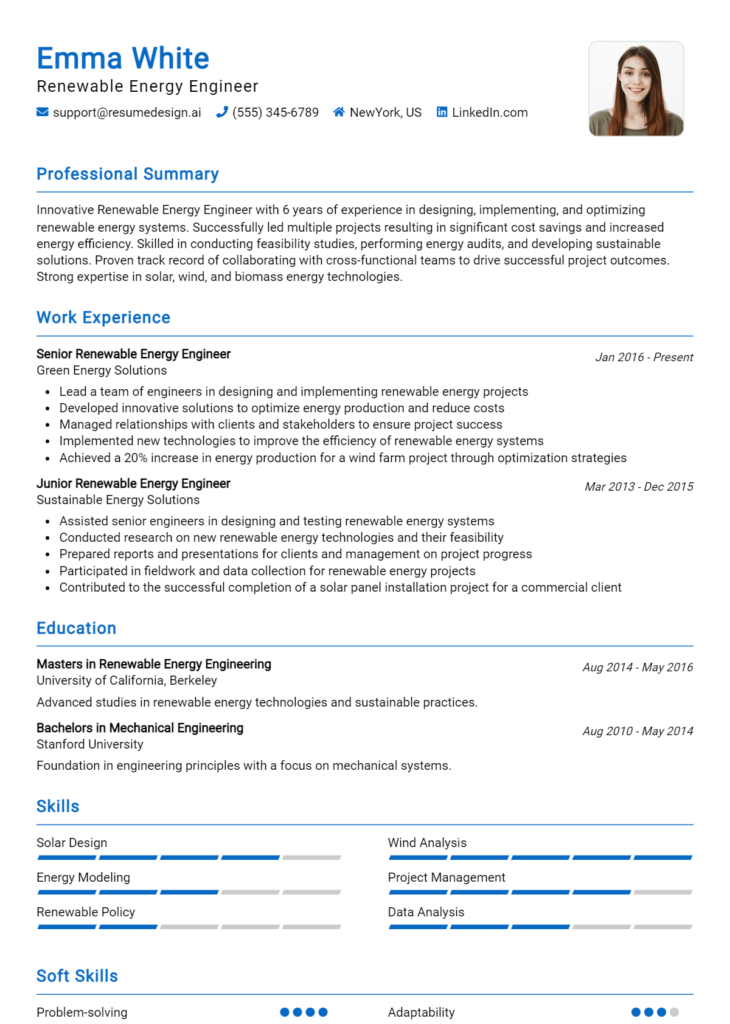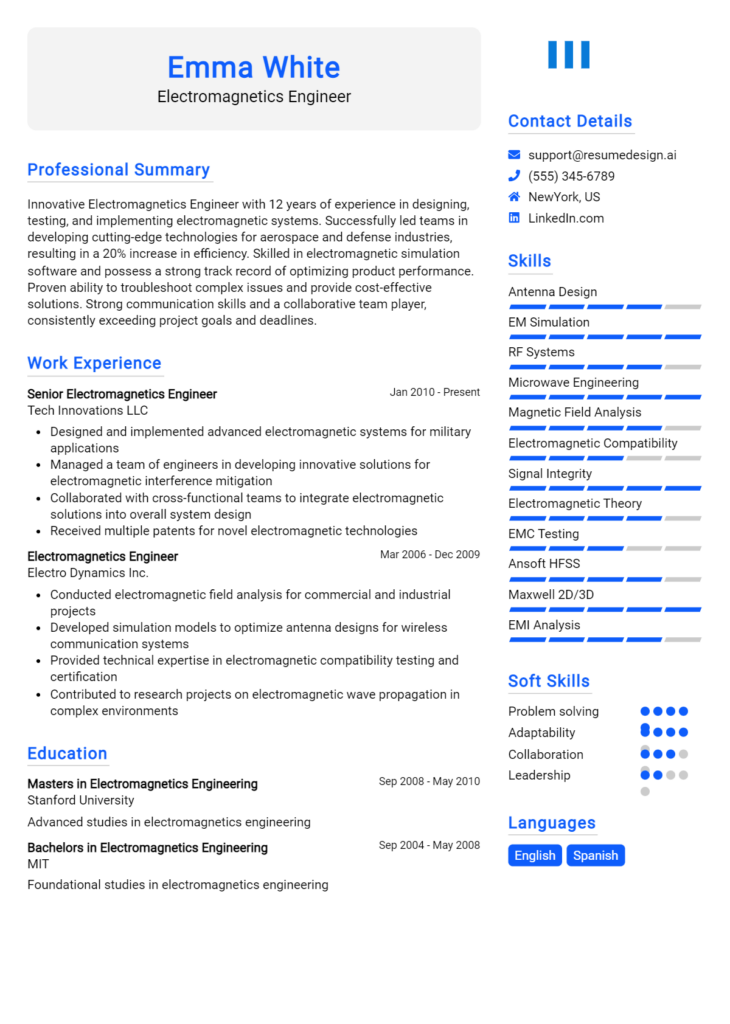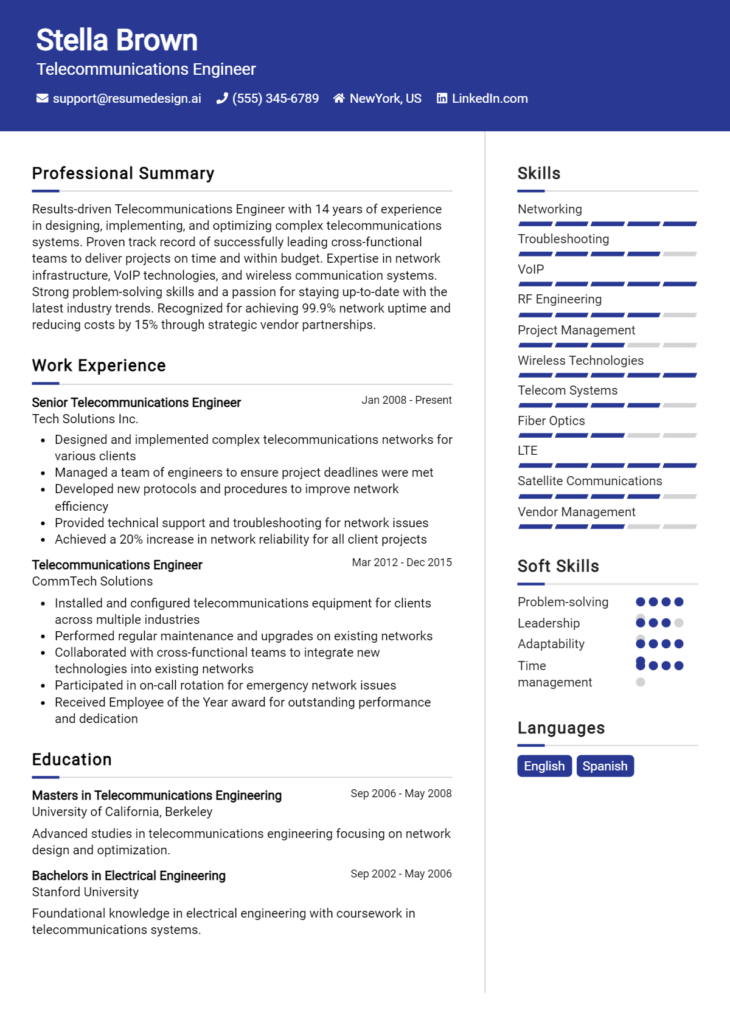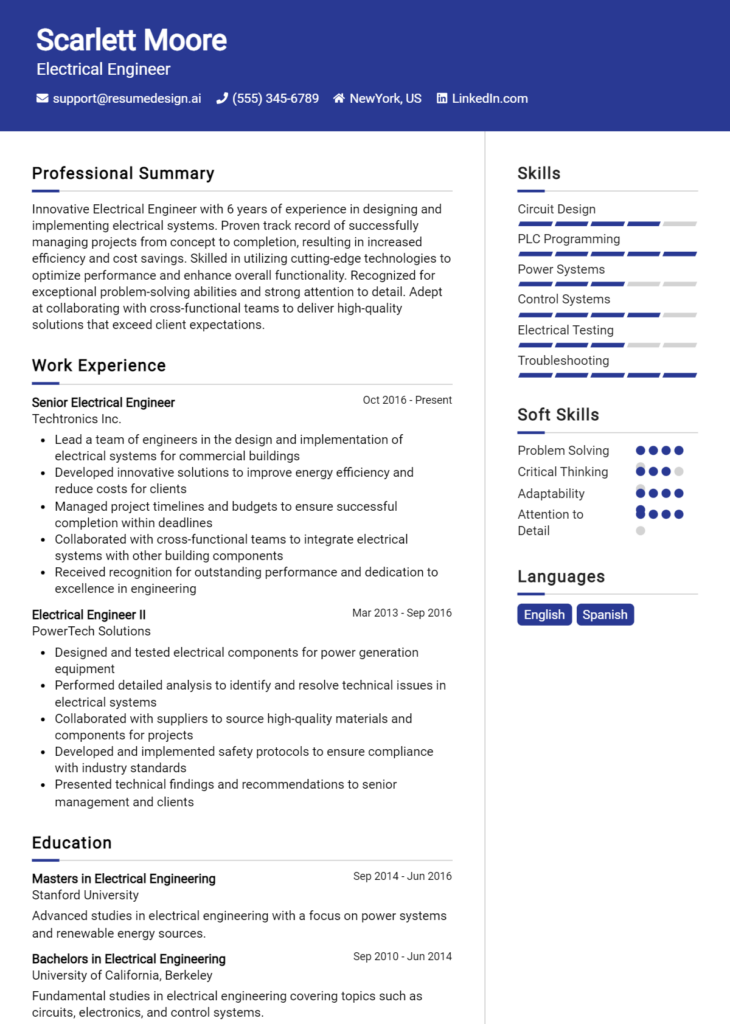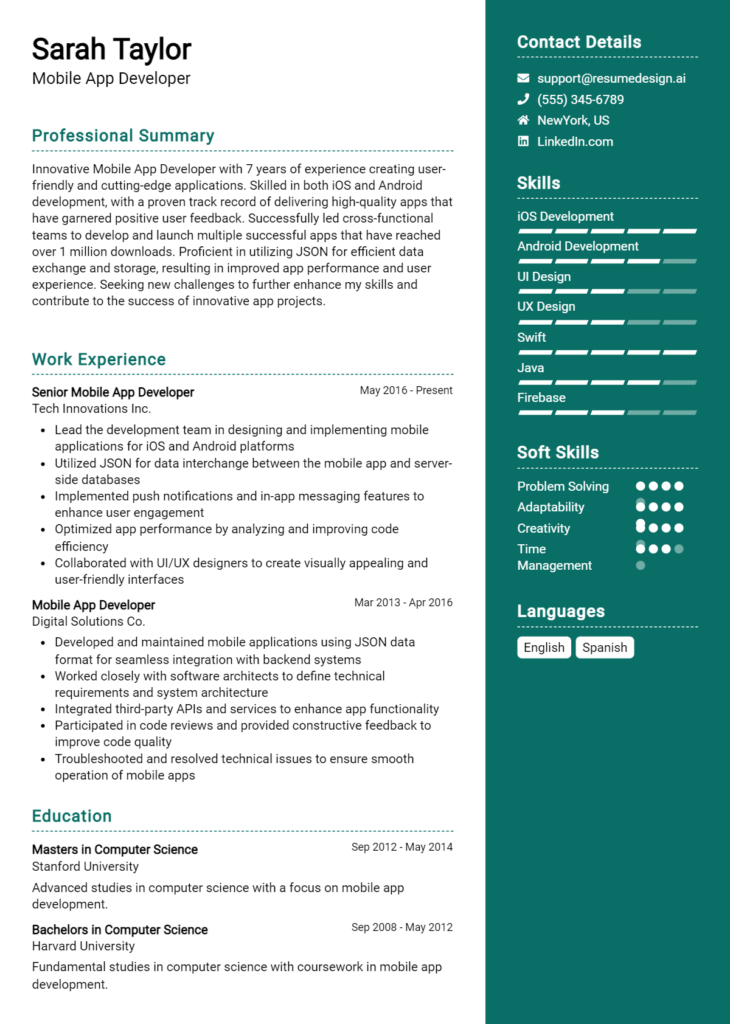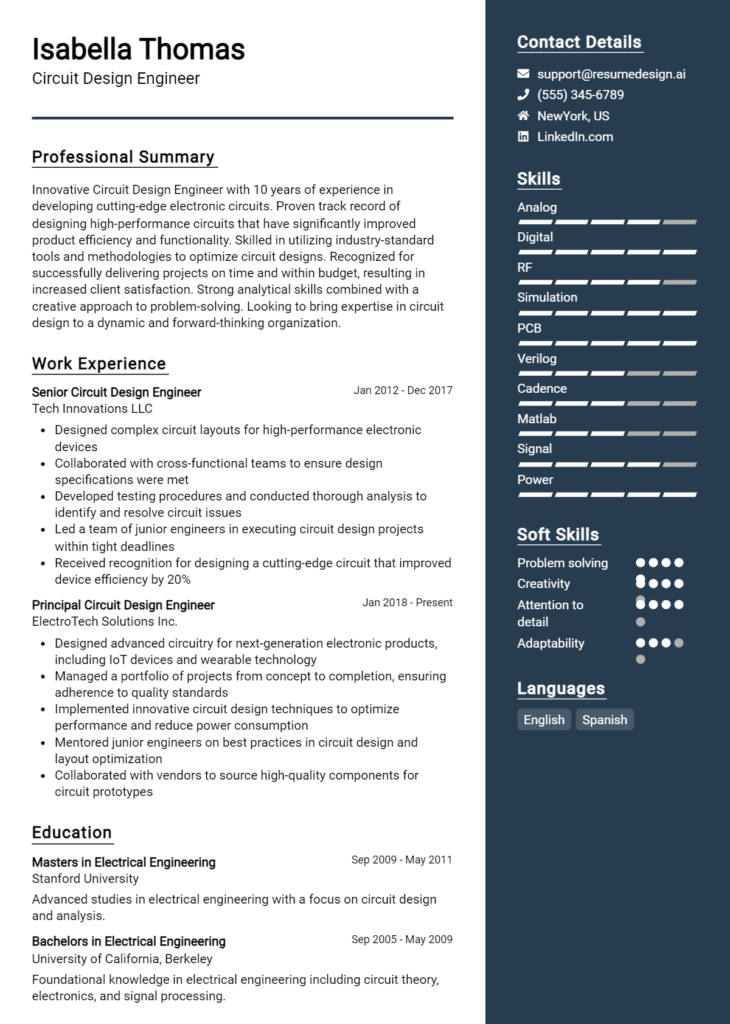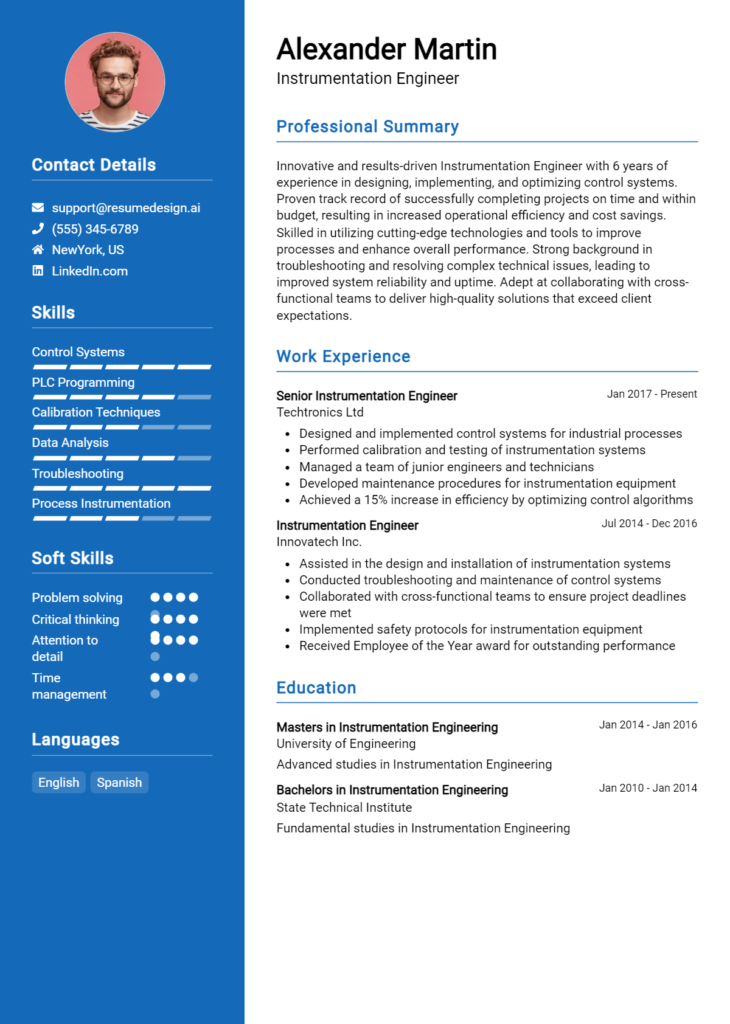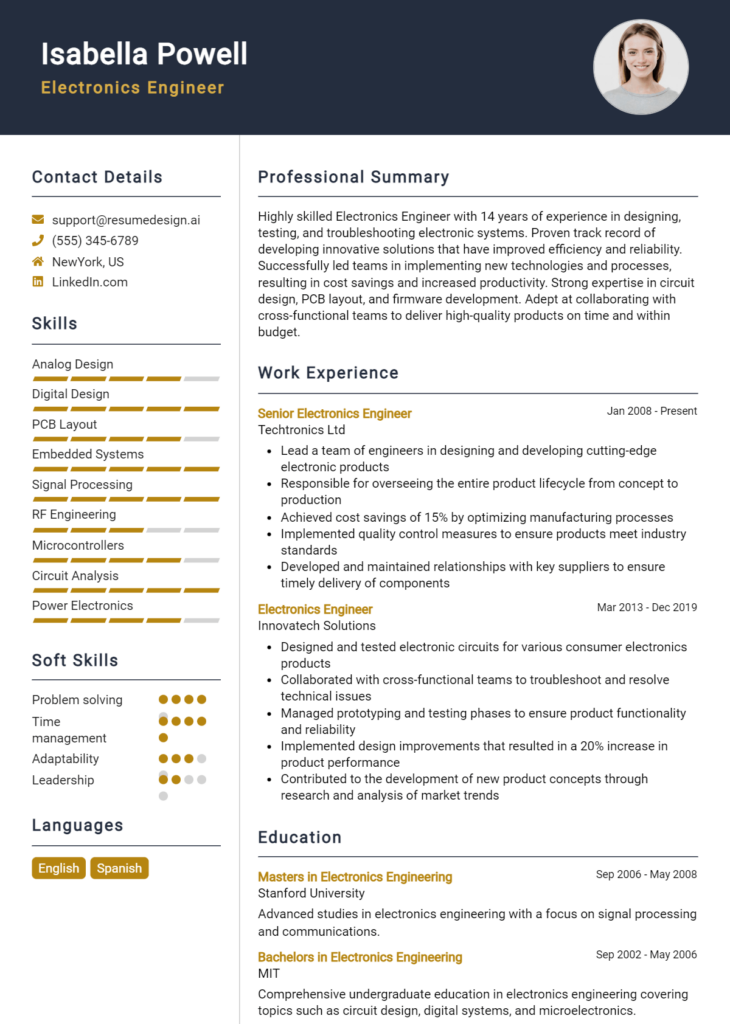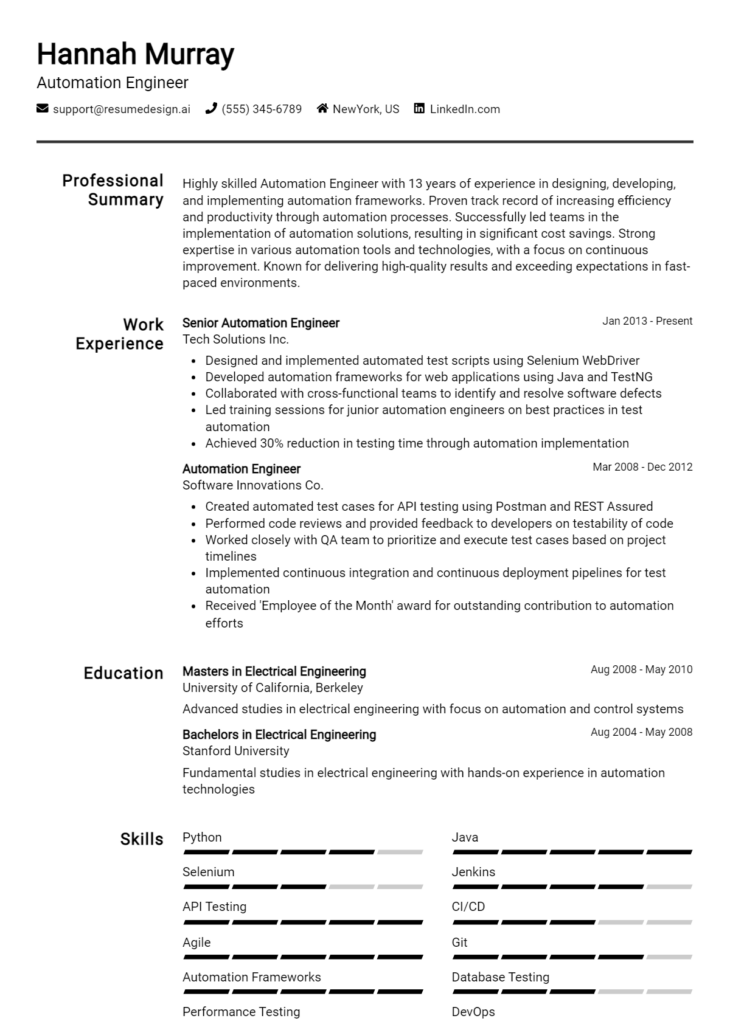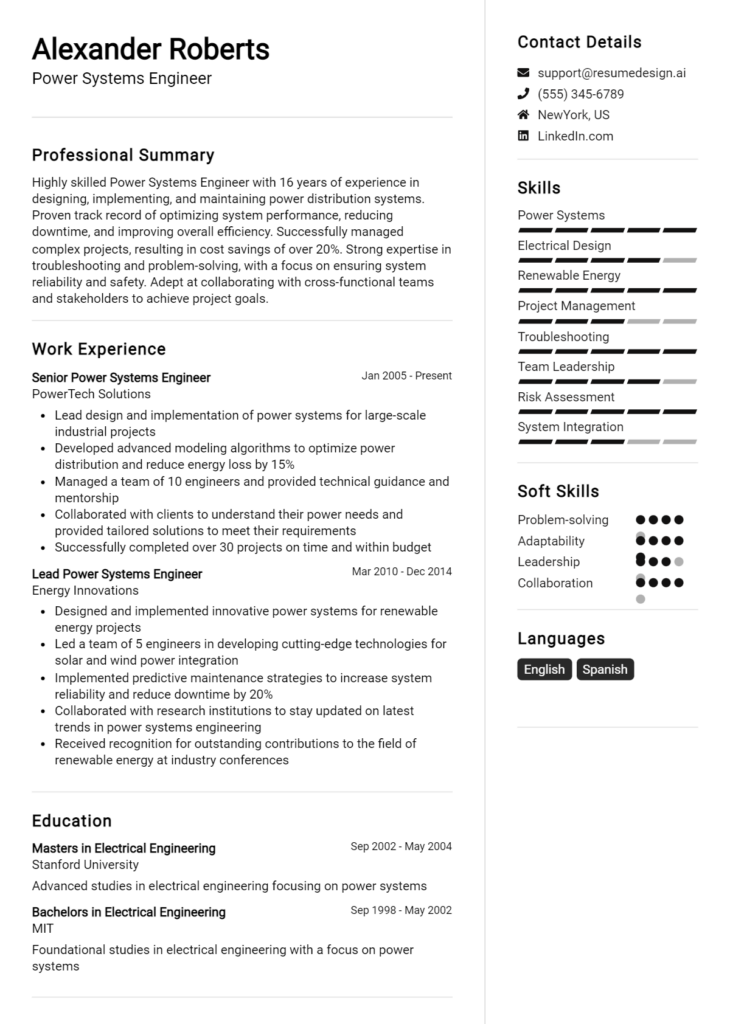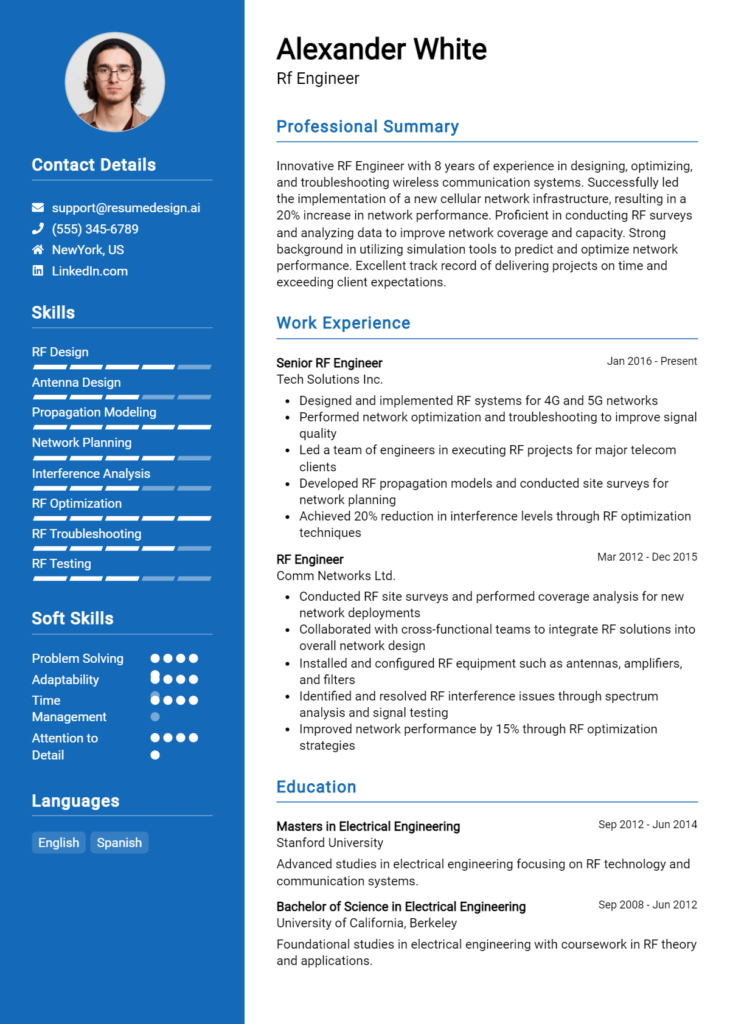Control Systems Engineer Core Responsibilities
A Control Systems Engineer plays a crucial role in designing, developing, and implementing control systems that optimize the performance of machinery and processes across various departments. This professional must possess strong technical knowledge, operational insight, and exceptional problem-solving skills to bridge engineering, production, and management functions effectively. Such competencies contribute significantly to meeting the organization's overall goals, ensuring efficiency, reliability, and safety. A well-structured resume can effectively showcase these qualifications, highlighting the candidate’s ability to drive innovation and improvement within the company.
Common Responsibilities Listed on Control Systems Engineer Resume
- Design and develop control systems for industrial processes.
- Analyze system performance and identify areas for improvement.
- Collaborate with cross-functional teams to integrate control systems.
- Conduct testing and validation of control algorithms.
- Provide technical support for system troubleshooting and maintenance.
- Document system specifications and operational procedures.
- Stay updated on industry trends and emerging technologies.
- Participate in system design reviews and risk assessments.
- Implement safety protocols and ensure compliance with regulations.
- Train personnel on control system operations and best practices.
- Utilize simulation software to model control systems.
High-Level Resume Tips for Control Systems Engineer Professionals
In today's competitive job market, a well-crafted resume is essential for Control Systems Engineer professionals striving to make a lasting first impression on potential employers. Your resume is often the first point of contact and serves as a powerful marketing tool that showcases your skills, expertise, and achievements in the field. It’s crucial that your resume not only highlights your technical capabilities but also reflects your unique contributions to past projects and teams. This guide will provide practical and actionable resume tips specifically tailored for Control Systems Engineer professionals, ensuring you stand out in a crowded applicant pool.
Top Resume Tips for Control Systems Engineer Professionals
- Tailor your resume to each job description by incorporating relevant keywords and phrases that match the requirements of the position.
- Highlight your technical expertise in control systems, automation, and programming languages such as MATLAB, Simulink, or Python.
- Showcase relevant experience with specific examples, detailing the projects you’ve worked on and your role in their success.
- Quantify your achievements by including metrics that demonstrate the impact of your work, such as efficiency improvements or cost savings.
- Include industry-specific certifications or training that bolster your qualifications and show your commitment to professional development.
- Utilize a clean, professional format that enhances readability and ensures key information stands out.
- Incorporate a summary statement at the top of your resume that succinctly captures your professional background and career goals.
- List relevant software tools and technologies you are proficient in, as these are critical to success in control systems engineering.
- Consider adding a section for relevant publications or presentations that demonstrate your thought leadership in the field.
By implementing these tips, you can significantly enhance your resume, making it a compelling representation of your qualifications and experiences. A well-structured and tailored resume will increase your chances of landing an interview in the Control Systems Engineer field, ultimately leading to the career opportunities you've been striving for.
Why Resume Headlines & Titles are Important for Control Systems Engineer
In the competitive field of control systems engineering, a resume headline or title plays a critical role in capturing the attention of hiring managers. A well-crafted headline can serve as the first impression a candidate makes, summarizing their key qualifications and strengths in a concise and impactful phrase. This brief yet powerful statement not only highlights the candidate's expertise but also aligns closely with the specific requirements of the job they are applying for. A strong headline is essential to stand out in a sea of applicants and can significantly enhance the chances of securing an interview.
Best Practices for Crafting Resume Headlines for Control Systems Engineer
- Keep it concise: Aim for a headline that is no longer than 10-12 words.
- Be role-specific: Tailor the headline to match the job title and responsibilities.
- Highlight key skills: Include specific technical skills or certifications relevant to the role.
- Use action verbs: Start with an action verb to convey dynamism and initiative.
- Showcase accomplishments: Mention any notable achievements or contributions in previous roles.
- Incorporate industry keywords: Use terminology that resonates within the control systems engineering field.
- Make it memorable: Use unique phrases or combinations to create a lasting impression.
Example Resume Headlines for Control Systems Engineer
Strong Resume Headlines
Innovative Control Systems Engineer Specializing in Automation Solutions
Experienced Control Systems Engineer with 10 Years in Robotics Development
Dynamic Control Systems Engineer with Expertise in PID Tuning and Simulation
Weak Resume Headlines
Engineer Looking for a Job
Control Systems Engineer with Various Skills
The strong headlines are effective because they are specific, showcasing particular skills and experiences that align with the control systems engineering role. They immediately convey value to the hiring manager and make the candidate memorable. In contrast, the weak headlines fail to impress due to their vagueness and lack of detail, which do not adequately highlight the candidate’s qualifications or unique selling points. A generic title does little to differentiate an applicant in a competitive job market, making it crucial to craft a standout headline.
Writing an Exceptional Control Systems Engineer Resume Summary
A well-crafted resume summary is crucial for a Control Systems Engineer as it serves as a powerful introduction to a candidate's qualifications, quickly capturing the attention of hiring managers. In a competitive job market, a strong summary highlights key skills, relevant experience, and significant accomplishments that align with the specific requirements of the role. This concise and impactful section should be tailored to the job description, providing a snapshot of what the candidate brings to the table and compelling employers to read further.
Best Practices for Writing a Control Systems Engineer Resume Summary
- Quantify achievements: Use specific numbers to demonstrate your impact, such as the percentage of efficiency improvement or cost savings.
- Focus on skills: Highlight technical skills that are relevant to control systems, such as proficiency in specific programming languages or software.
- Tailor the summary: Customize your summary for each job application to align with the job description and company goals.
- Use action verbs: Start sentences with strong action verbs to convey a sense of initiative and impact.
- Keep it concise: Aim for 2-4 sentences that effectively summarize your qualifications without unnecessary detail.
- Showcase relevant experience: Mention specific roles or projects that demonstrate your expertise in control systems engineering.
- Highlight certifications or education: Include relevant certifications or degrees that bolster your qualifications.
- Maintain a professional tone: Use clear and professional language to convey your expertise and suitability for the role.
Example Control Systems Engineer Resume Summaries
Strong Resume Summaries
Results-driven Control Systems Engineer with over 7 years of experience in developing and implementing automation solutions. Successfully increased production efficiency by 30% through the design of a new control system architecture.
Detail-oriented Control Systems Engineer skilled in MATLAB and Simulink, with a proven track record of reducing system downtime by 25% through proactive diagnostics and control optimization strategies.
Innovative engineer with expertise in PLC programming and HMI development, achieving a 40% reduction in operational costs by streamlining control processes in a manufacturing environment.
Dynamic Control Systems Engineer with a Master’s degree in Electrical Engineering, focused on enhancing system performance and reliability; led a project that improved system responsiveness by 50% within 6 months.
Weak Resume Summaries
Experienced engineer looking for new opportunities in control systems.
Control Systems Engineer with some experience in the industry, interested in working on diverse projects.
The examples of strong resume summaries are considered effective because they provide quantifiable results, highlight specific skills, and are directly relevant to the role of a Control Systems Engineer. In contrast, the weak summaries lack detail, are vague, and do not showcase any significant achievements or qualifications, making them less compelling to potential employers.
Work Experience Section for Control Systems Engineer Resume
The work experience section is a critical component of a Control Systems Engineer resume, as it serves to demonstrate the candidate's technical skills and practical knowledge in real-world applications. This section not only highlights the engineer's ability to design, implement, and optimize control systems but also showcases their capability to manage teams and deliver high-quality products that meet industry standards. By quantifying achievements and aligning past experiences with the specific requirements of the control systems field, candidates can effectively communicate their value to potential employers and stand out in a competitive job market.
Best Practices for Control Systems Engineer Work Experience
- Use clear, industry-specific terminology to showcase your technical expertise.
- Quantify your achievements with metrics such as cost savings, efficiency improvements, or project timelines.
- Highlight leadership roles in team projects to demonstrate your ability to manage and motivate teams.
- Focus on relevant experiences that align with the job requirements listed in the job description.
- Include a mix of technical and soft skills to present a well-rounded profile.
- Utilize action verbs to convey your contributions and impact effectively.
- Keep descriptions concise and focused on outcomes, rather than just duties.
- Tailor your work experience for each application to emphasize relevant skills and accomplishments.
Example Work Experiences for Control Systems Engineer
Strong Experiences
- Led a team of 5 engineers in the design and implementation of a new automated control system, resulting in a 30% reduction in production downtime.
- Developed a predictive maintenance program that improved equipment reliability by 25%, saving the company $200,000 annually.
- Collaborated with cross-functional teams to integrate advanced control algorithms, enhancing product performance and customer satisfaction ratings by 15%.
- Managed multiple projects simultaneously, delivering all within budget and ahead of schedule, which earned recognition from senior management.
Weak Experiences
- Worked on various engineering projects that involved control systems.
- Assisted in the design of control systems without specifying any achievements or outcomes.
- Participated in team meetings to discuss project status and updates.
- Helped troubleshoot issues with systems but did not provide detail on the impact or results.
The examples categorized as strong experiences are considered effective because they provide specific, quantifiable outcomes that demonstrate the candidate's impact on projects and their ability to lead teams. They highlight technical skills and collaboration while showcasing measurable results that align with the expectations of the industry. In contrast, the weak experiences lack detail and fail to convey the candidate's contributions or the significance of their roles, making them less compelling to potential employers.
Education and Certifications Section for Control Systems Engineer Resume
The education and certifications section of a Control Systems Engineer resume is crucial as it provides potential employers with a clear understanding of the candidate's academic foundation and commitment to the field. This section not only highlights relevant degrees but also showcases industry-recognized certifications and specialized training that can significantly enhance the candidate's credibility. By including relevant coursework and certifications, candidates demonstrate their dedication to continuous learning and professional development, aligning their qualifications with the demands of the job role.
Best Practices for Control Systems Engineer Education and Certifications
- Focus on relevant degrees such as Electrical Engineering, Control Systems Engineering, or Mechatronics.
- Include industry-recognized certifications like Certified Control Systems Technician (CCST) or Professional Engineer (PE) license.
- Provide details about key coursework that aligns with control systems, such as Systems Dynamics or Signal Processing.
- Highlight any specialized training or workshops related to control systems tools and software, such as MATLAB or LabVIEW.
- List certifications that demonstrate continuous learning, especially those obtained in the last few years.
- Use clear formatting to emphasize educational achievements and certifications, making it easy for recruiters to spot key qualifications.
- Consider including relevant projects or research work that showcase practical application of your education.
- Ensure that all listed qualifications are up-to-date and accurately reflect your current skills and knowledge.
Example Education and Certifications for Control Systems Engineer
Strong Examples
- B.S. in Electrical Engineering, University of Technology, 2021
- Certified Control Systems Technician (CCST), ISA, 2022
- Relevant Coursework: Advanced Control Theory, Digital Signal Processing
- MATLAB Certified Associate, 2023
Weak Examples
- B.A. in English Literature, University of Arts, 2018
- Certification in Basic Computer Skills, 2019
- Coursework: Introduction to Psychology
- Old certification: AutoCAD 2015 Certified User, 2015
The examples provided highlight the difference between strong and weak qualifications in the context of a Control Systems Engineer role. Strong examples demonstrate relevant education and certifications that directly align with the skills and knowledge required for the position, showing a clear fit for the job. In contrast, weak examples include irrelevant degrees and outdated certifications that do not contribute to the candidate’s credibility in the control systems field, ultimately reducing their competitiveness in the job market.
Top Skills & Keywords for Control Systems Engineer Resume
In the competitive field of control systems engineering, having the right skills prominently featured on your resume is vital for standing out to potential employers. Skills not only highlight your technical proficiency but also demonstrate your ability to solve complex problems, collaborate with multidisciplinary teams, and adapt to evolving technologies. A well-crafted resume that emphasizes both hard and soft skills can effectively convey your qualifications and readiness for the role, increasing your chances of landing an interview. For aspiring control systems engineers, showcasing a balanced blend of these skills can make a significant difference in their job search.
Top Hard & Soft Skills for Control Systems Engineer
Soft Skills
- Problem-solving
- Communication
- Team collaboration
- Critical thinking
- Adaptability
- Time management
- Attention to detail
- Creativity
- Leadership
- Project management
Hard Skills
- Control theory
- MATLAB/Simulink
- PLC programming
- System modeling and simulation
- Instrumentation and sensing technologies
- Embedded systems design
- Data analysis and interpretation
- Robotics and automation
- Circuit design
- Technical documentation
For more information on enhancing your skills and showcasing your work experience, consider exploring additional resources to help you create a standout resume.
Stand Out with a Winning Control Systems Engineer Cover Letter
Dear Hiring Manager,
I am writing to express my interest in the Control Systems Engineer position at [Company Name], as advertised on [Job Board/Company Website]. With a Bachelor’s degree in Electrical Engineering and over five years of hands-on experience in designing, implementing, and optimizing control systems, I am excited about the opportunity to contribute to your innovative projects. My background in automation and control theory, coupled with my proficiency in various programming languages such as MATLAB and Python, enables me to tackle complex engineering challenges effectively.
In my previous role at [Previous Company], I successfully led a team responsible for the development of a state-of-the-art control system that improved operational efficiency by 30%. I utilized model predictive control techniques to enhance system performance and reduced downtime through predictive maintenance strategies. My ability to collaborate with cross-functional teams has been key in ensuring that our projects are completed on time and meet the highest standards of quality. I am particularly drawn to [Company Name] because of its commitment to cutting-edge technology and sustainability, which aligns with my professional values and aspirations.
I am eager to bring my expertise in control systems design and my passion for innovation to [Company Name]. I am confident that my technical skills, problem-solving abilities, and dedication to continuous improvement can make a significant impact on your team. I look forward to the opportunity to discuss how I can contribute to your projects and help drive [Company Name] towards its goals.
Thank you for considering my application. I hope to discuss my qualifications further in an interview.
Sincerely,
[Your Name]
[Your Phone Number]
[Your Email Address]
Common Mistakes to Avoid in a Control Systems Engineer Resume
When crafting a resume for a Control Systems Engineer position, it’s essential to present your skills and experiences effectively to stand out in a competitive job market. However, many candidates make common mistakes that can undermine their chances of landing an interview. By avoiding these pitfalls, you can create a compelling resume that highlights your qualifications and expertise in control systems engineering.
Lack of Specificity: Failing to provide specific examples of your achievements can make your resume vague. Use quantifiable results to showcase your impact on projects, such as "improved system efficiency by 20%."
Ignoring Keywords: Many companies use Applicant Tracking Systems (ATS) to screen resumes. Not including relevant keywords from the job description can result in your resume being overlooked.
Overly Technical Jargon: While technical expertise is crucial, using too much jargon can alienate non-technical recruiters. Striking a balance between technical language and clear communication is vital.
Inconsistent Formatting: A cluttered or inconsistent format can distract from your qualifications. Use uniform headings, bullet points, and fonts to create a professional appearance.
Neglecting Soft Skills: Control Systems Engineers often work in teams and must communicate effectively. Failing to highlight soft skills like teamwork, problem-solving, and communication can be a missed opportunity.
Too Much Length: A resume that is overly lengthy can deter hiring managers from reading it. Aim for a concise one to two-page resume that captures the most relevant information.
Not Tailoring the Resume: Submitting a generic resume for every position can hurt your chances. Tailor your resume to reflect the specific requirements and responsibilities of each job you apply for.
Omitting Continuing Education: The field of control systems is constantly evolving. Failing to mention relevant certifications, courses, or professional development can signal a lack of commitment to staying current in the field.
Conclusion
As a Control Systems Engineer, it’s crucial to stay competitive in an ever-evolving job market. This article has highlighted key responsibilities such as designing, implementing, and optimizing control systems, as well as the importance of proficiency in programming languages and simulation tools. Additionally, the need for strong analytical skills and effective communication cannot be overstated, as these attributes are essential for collaborating with cross-functional teams and stakeholders.
To ensure your resume reflects your qualifications and stands out to potential employers, take a moment to review it critically. Are your skills and experiences clearly articulated? Have you tailored your resume to highlight the most relevant aspects of your background?
If you're looking to enhance your resume, consider utilizing available resources such as resume templates, which can help you create a polished and professional layout. Additionally, a resume builder can guide you through the process of crafting a compelling resume tailored to your specific role. Reviewing resume examples can provide inspiration and insight into what works best in the field. Don't forget about the importance of a strong first impression with a well-crafted cover letter, which you can create using cover letter templates.
Take action today to refine your resume and increase your chances of landing your next Control Systems Engineer position!

